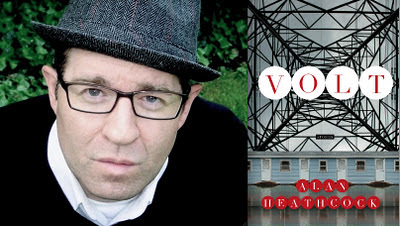Process is a curiosity to folks, and I understand the interest. People want a behind-the-scenes look into an author’s day, and want to know an artist’s mind. Sadly, though, I think many aspiring writers are looking for a mythical fountain-of-greatness, thinking that if they work in the manner of their favorite author then the quality of their work will match that of the author. This is why I feel the need to explain that my process is ever changing, and the process I use now has developed over my sixteen years of being a writer, and it may be different at this time next month. It’s my process. I believe the process of being a writer is that you must find your own process.
That said, here’s how I’ve been working lately, with a description of my last writing day as an example:
STEP 1: Being a writer has ruined me to reading. I don’t really mind. I’m ruined because I always hold a yellow crayon or marker while reading, and as I read I highlight any passage I think has value. I might highlight a great line of dialog, a great image, a great noun or verb, an interesting mannerism, whatever.
I start off each writing day by going through what I’d read the day(s) before and hand-writing out every newly highlighted passage into a composition notebook. The idea is that I’m training my brain and eyes and hand to write at the same high quality as the highlighted passages. I have dozens of notebooks filled with passages, my own personal library of greatness. On this day, I entered passages from James Salter’s Dusk and Daniel Woodrell’s Winter’s Bone. Here’s a couple of examples of passages I jotted into my notebook:
From Salter: “In the harbor the boats lay still, not the slightest stirring of masts, not the softest clink of a sheave.”
From Woodrell: “Snow covered the tracks and made humps over the rails and the twin humps guided her.”
STEP 2: I decide my task for the day. I don’t believe in demanding a word count for myself, as I feel word counts are generally arbitrary and hedge toward quantity instead of quality. I try and choose a reasonable task, usually one scene or moment in the story. I usually write a story chronologically, so, naturally, I usually decide to write the next scene/moment in the narrative. On this day, I task myself to write a scene where my protagonist is floating in a house on the roiling currents of a great flood while talking with a recovering meth-addict/dealer, who’s telling her why he’s done certain bad things in his past.
STEP 3: I’m what I call an “empathetic writer,” which means I believe the most powerful place from which to write is through a character and to have as few touches of a narrator as possible. I work to fully inhabit my point-of-view characters, to see though their eyes, hear through their ears, think and feel and imagine, in full, as the character. Much of my day is working to get my imagination all the way into the place of empathetic truth. This means I need to fully realize the world and the events of the scene, the scene’s choreography and timing, and the sensory experiences and emotional content of the character.
The way I write has a closer kinship to acting than to journalism, though I use techniques from both disciplines. From my training as a journalist, I use research. On this day, I need to get my head around how floating in flood waters might feel and smell and look. I turn to videos online, watching home videos of floods from Alabama and Iowa, and I also look at a few videos from the tsunami that ravaged Japan. I take notes. I make sketches. From this, eventually the flood becomes realized in my imagination.
Next, I have to figure out the content of the dialog, and specifically what the drug-dealer will offer up in terms of insight as to why humans do awful things like sell drugs to others or commit crimes of violence. I try to think of any books I’ve read, any plays or films or TV shows I’ve seen, that might help. On this day, I read a bit of Trainspotting, Ask the Dust, a bit of Flannery O’Conner, a touch of Nietzsche. I read the Sermon on the Mount. Then, I watch a bit of Sons of Anarchy, and scenes from Pulp Fiction and There Will Be Blood. After all of this, I come away with the gist of the dialog, and the philosophical insight the dialog must convey (something I believe to be true and will attempt to prove with the scene).
Finally, I try to place myself inside the character, which in this case is a twenty-three year old pregnant woman, a former Army mechanic, who is now, with her father incapacitated and her brother ill, in charge of the well being of this floating house/ark. I take the setting I’ve imagined, and the dialog written for the drug-dealer, and now must figure out how she might feel, think, and imagine, in this situation. I read a book on the Stanislavski System of method acting and find it very useful to take the emotional content of my own past and place those feelings into the character. I work all this out in my imagination, playing the scene in my mind over and over until it feels both true and dramatically potent.
Step 3 takes up most of my day.
STEP 4: I sit down at the computer and do my best to find the words to capture the empathetic experience of my character, as it’s vividly alive in my imagination.
STEP 5: I revise, scrutinizing every word, phrase, sentence, and paragraph, until I’ve delivered the scene into absolute truth and clarity.
STEP 6: I do whatever I need to disconnect from the empathetic experience of my character before my wife and kids get home. On this day, a beautiful autumn day in Idaho, I go for a long run while listening to the new Wilco album, and stop by the Gyros Shack for a little treat. I come home smiling.
From Salter: “In the harbor the boats lay still, not the slightest stirring of masts, not the softest clink of a sheave.”
From Woodrell: “Snow covered the tracks and made humps over the rails and the twin humps guided her.”
STEP 2: I decide my task for the day. I don’t believe in demanding a word count for myself, as I feel word counts are generally arbitrary and hedge toward quantity instead of quality. I try and choose a reasonable task, usually one scene or moment in the story. I usually write a story chronologically, so, naturally, I usually decide to write the next scene/moment in the narrative. On this day, I task myself to write a scene where my protagonist is floating in a house on the roiling currents of a great flood while talking with a recovering meth-addict/dealer, who’s telling her why he’s done certain bad things in his past.
STEP 3: I’m what I call an “empathetic writer,” which means I believe the most powerful place from which to write is through a character and to have as few touches of a narrator as possible. I work to fully inhabit my point-of-view characters, to see though their eyes, hear through their ears, think and feel and imagine, in full, as the character. Much of my day is working to get my imagination all the way into the place of empathetic truth. This means I need to fully realize the world and the events of the scene, the scene’s choreography and timing, and the sensory experiences and emotional content of the character.
The way I write has a closer kinship to acting than to journalism, though I use techniques from both disciplines. From my training as a journalist, I use research. On this day, I need to get my head around how floating in flood waters might feel and smell and look. I turn to videos online, watching home videos of floods from Alabama and Iowa, and I also look at a few videos from the tsunami that ravaged Japan. I take notes. I make sketches. From this, eventually the flood becomes realized in my imagination.
 |
| "I drink your milkshake." |
Finally, I try to place myself inside the character, which in this case is a twenty-three year old pregnant woman, a former Army mechanic, who is now, with her father incapacitated and her brother ill, in charge of the well being of this floating house/ark. I take the setting I’ve imagined, and the dialog written for the drug-dealer, and now must figure out how she might feel, think, and imagine, in this situation. I read a book on the Stanislavski System of method acting and find it very useful to take the emotional content of my own past and place those feelings into the character. I work all this out in my imagination, playing the scene in my mind over and over until it feels both true and dramatically potent.
Step 3 takes up most of my day.
STEP 4: I sit down at the computer and do my best to find the words to capture the empathetic experience of my character, as it’s vividly alive in my imagination.
STEP 5: I revise, scrutinizing every word, phrase, sentence, and paragraph, until I’ve delivered the scene into absolute truth and clarity.
STEP 6: I do whatever I need to disconnect from the empathetic experience of my character before my wife and kids get home. On this day, a beautiful autumn day in Idaho, I go for a long run while listening to the new Wilco album, and stop by the Gyros Shack for a little treat. I come home smiling.






